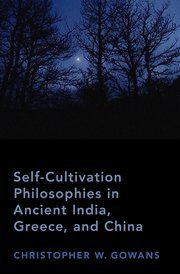Books
Self-Cultivation Philosophies in Ancient India, Greece, and China
New York: Oxford University Press, 2021
Self-cultivation philosophies put forward a program of development for ameliorating the lives of human beings. The book shows how the concept of self-cultivation philosophy provides an interpretive framework for understanding, comparing, assessing and learning from several philosophical outlooks in India (the Bhagavad Gita, Samkhya and Yoga, and Buddhism), the Greco-Roman world (Epicureanism, Stoicism, and Pyrrho and Pyrrhonian Skepticism), and China (Confucianism, Daoism, and Chan Buddhism).
Purchase at:
Buddhist Moral Philosophy:
An Introduction
New York: Routledge, 2014
The book introduces the reader to contemporary philosophical interpretations and analyses of Buddhist ethics. It begins with a survey of traditional Buddhist ethical thought and practice, mainly in the Pali Canon and early Mahayana schools, and an account of the emergence of Buddhist moral philosophy as a distinct discipline in the modern world. It then examines recent debates about karma, rebirth and nirvana, well-being, normative ethics, moral objectivity, moral psychology, and the issue of freedom, responsibility and determinism. The book also introduces the reader to philosophical discussions of topics in socially engaged Buddhism such as human rights, war and peace, and environmental ethics.
Table of Contents
Purchase at:
Philosophy of the Buddha
New York: Routledge, 2003
The book is a philosophical introduction to the teaching of the Buddha. It carefully guides readers through the basic ideas and practices of the Buddha, including kamma (karma), rebirth, the not-self doctrine, the Four Noble Truths, the Eightfold Path, ethics, meditation, non-attachment, and Nibbâna (Nirvana).
The book includes an account of the life of the Buddha as well as comparisons of his teaching with practical and theoretical aspects of some Western philosophical outlooks, both ancient and modern. Most distinctively, Philosophy of the Buddha explores how Buddhist enlightenment could enable us to overcome suffering in our lives and reach our full potential for compassion and tranquillity.
Table of Contents
Purchase at:
Innocence Lost: An
Examination of Inescapable
Moral Wrongdoing
New York: Oxford University Press, 1994
The book defends the thesis that moral wrongdoing is sometimes inescapable. We may have moral responsibilities to persons which conflict and would be wrong to violate even when they do conflict. The book argues that this position makes the most sense of our moral experience and the way in which persons are valuable to us. It examines the moral dilemmas debate and maintains that what is important is not whether or not there are irresolvable moral conflicts, but whether there are moral conflicts in which moral wrongdoing is unavoidable. Though it would be incoherent to decide to perform incompatible actions, there is nothing incoherent in supposing that we have conflicting moral responsibilities.
Table of Contents
Purchase at:
Moral Dilemmas
New York: Oxford University Press, 1987
Moral philosophers have usually supposed that conflicts among moral duties are only apparent, and that in the final analysis there is a single correct solution to every moral problem. This viewpoint is especially predominant in Kantianism and Utilitarianism. However, in recent years some philosophers have argued that there are moral conflicts that are not resolvable, at least not without remainder.
This anthology assembles the principal contributions in the debate about moral dilemmas prior to 1987. It begins with a detailed introduction, followed by selections from Kant, Mill, Bradley and Ross, providing the historical background to the contemporary debate. This is followed by essays from Bernard Williams, Thomas Nagel, Ruth Barcan Marcus, Philippa Foot, R.M. Hare, and Alan Donagan among others.
Table of Contents
Purchase at:
Moral Disagreements: Classic and Contemporary Readings
New York: Routledge, 2000
A central question in philosophy is whether or not moral disagreements can be rationally resolved. This question is a stepping-stone to some perennial issues in moral philosophy such as relativism, skepticism and objectivism--as well as contemporary concerns about human rights. This anthology brings together readings on these topics from the history of philosophy, recent work in anthropology, and a variety of contemporary philosophical voices, some supporting more objective approaches and some challenging these.
Table of Contents
Purchase at:





